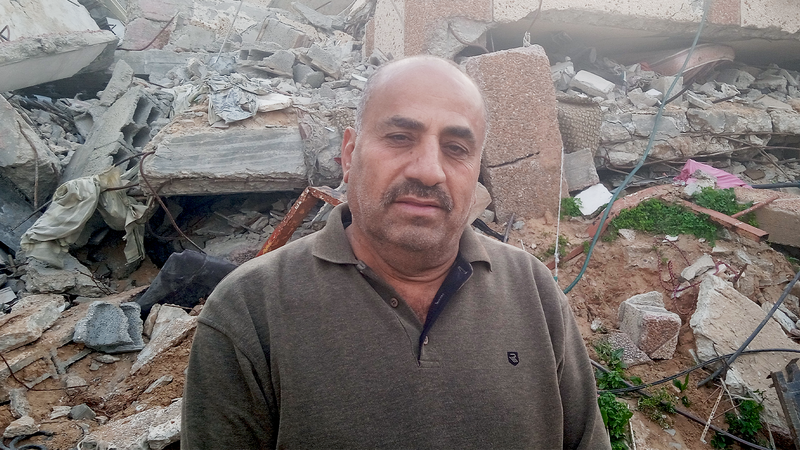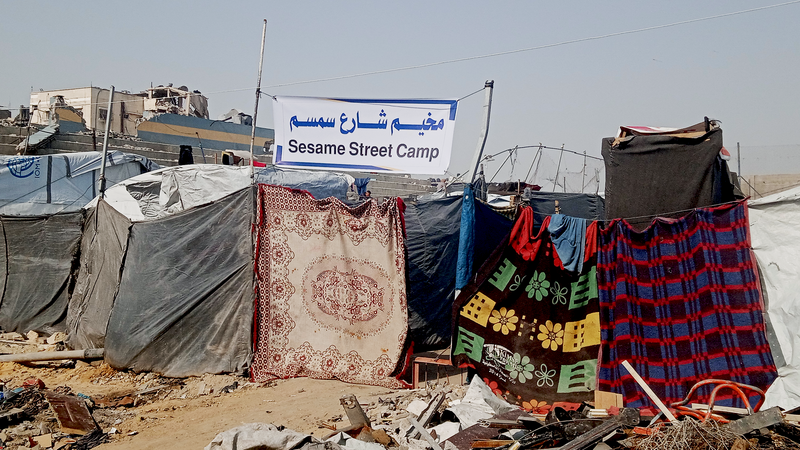The Electronic Intifada 9 April 2025

Walid Shaheen, Shabab Jabaliya’s director since 2012, puts the club’s losses at around a million dollars.
The Electronic IntifadaThe blue-and-white sign reads “Sesame Street Camp,” and on either side of it are blankets and tarps and rugs strung up across wire to provide privacy for those living inside.
The site of this temporary displacement camp in Jabaliya, in northern Gaza, used to be the five-a-side football field of Shabab Jabaliya Club. What is now known as Sesame Street – named as such by a donor – is where the club would play games, practice and train.
But Israel destroyed the club complex during its ground invasion of Jabaliya in May 2024. The club’s former grounds are now home to about 120 displaced people who, after Israel’s repeated air and ground assaults on Jabaliya since October 2023, had nowhere else to go.
The entire club complex, about 2 acres, is now nearly unrecognizable. It once had a three-story administrative building, a gym and multiple training halls, with many considering the complex one of Gaza’s most advanced sports facilities. Its grounds used to be filled with activity and energy, but now the bleachers are the only immediately recognizable infrastructure still standing.
Walid Shaheen, 52, Shabab Jabaliya’s director since 2012, puts the club’s losses at around a million dollars.
“I joined the club and became attached to it because of my love for sports,” he said. “I started developing it at the expense of my primary job and my family time. However, I was determined to continue and do everything I could to advance the club.”
Shabab Jabaliya, or the Jabaliya Youth Sports Club, was founded in 1994, and it competed in Jabaliya’s Palestinian Premier League. The club is popularly known as the “Northern Rebels,” and its official colors are yellow and blue. Its emblem features the Palestinian flag on both sides and includes the words cooperation, brotherhood and work, with two olive branches.
Shaheen, who also worked as a car salesman before the war, helped develop Shabab Jabaliya alongside coach and Palestine Olympic Committee vice president Asaad al-Majdalawi, 58, as football gained more popularity in Gaza in the 2000s, when international football stars Lionel Messi, Cristiano Ronaldo and others captivated local audiences. Shabab Jabaliya benefited from the sport’s newfound resurgence in Gaza, and eventually the club expanded its scope to compete with clubs across Gaza.
Shaheen has loved football since he was young. “I used to play in public fields during high school as a right winger. My dream was to establish a football club, and through my position, I have worked to revive the sport.”
Seeing the club come so far only to have its home base destroyed by Israeli attacks has been devastating for Shaheen and al-Majdalawi, but at least the grounds can be rebuilt. The team’s other losses since October 2023 are simply irretrievable.
“More than just a teammate”
During this genocide, Israeli attacks have killed many of Shabab Jabaliya’s staff and players.
Coach Nihad al-Malfooh and club striker Muhammad al-Malfooh, 29, were killed during an Israeli ground assault on Jabaliya in December 2023. Israeli forces stormed his family home and denigrated and then detained the young men. According to a survivor of the massacre interviewed by Masrawy media, the Israeli army allowed the young men to return home, falsely assuring them of safety, and then targeted the house and killed everyone inside.

“Sesame Street Camp” is home to around 120 displaced people on the former grounds of Shabab Jabaliya’s training complex.
The Electronic Intifada
Player Adham Khattab, 32, described his bond with Muhammad as “more than just a teammate relationship, we were like brothers.” They spent a lot of time together on and off the field and were motivating presences in each others’ lives.
“Al-Malfooh was very ambitious – he dreamed of signing with an international club.”
Board member Muhammad Hijazi and his nephew were also killed by Israeli attacks, as were the club’s youth coach, Deeb Barakat, several Premier League players, including Mustafa Shaheen (the nephew of the club’s president), Muhannad Arouq, Jihad Qaddous and the team’s physiotherapist Ouda al-Hou.
From the youth team, goalkeeper Karim Hammad and other former club players, such as Wahib Ouda and Ahmed Mansour, were also killed.
Tanks on the playing field
Player Ahmad Amira, 38, described the club as his second home.
“I always felt comfortable and valued there,” he said. “My connection to the club was more than just sports. I spent seven years with the first team until I became the captain.”
When he heard what happened to the club, it felt like a part of him “was taken away, and it was an overwhelming pain for me,” Amira said.
As soon as the ceasefire in January 2025 was announced, he headed back with some teammates to check on the club. He said he was shocked by the scale of destruction.
Abu Khaled, 35, a Shabab Jabaliya fan, was also unable to comprehend how such a beloved place could be destroyed overnight. When he was evacuating from Jabaliya to Gaza City on foot with his family in October 2024, they “passed by the club’s site, and I saw a large number of tanks stationed at its destroyed entrance.”
“Memories flashed before my eyes, like the first time I set foot in the club in 2000 and [memories of] my favorite player, goalkeeper Ramzi Saleh. I felt an immense pain and sorrow for everything we had lost, including Shabab Jabaliya Club.”
Ramzi Saleh is one of the club’s biggest successes. The top-tier football player was the club’s first goalkeeper, and he later secured a contract with the prestigious Al Ahly SC of Egypt.
Player Amira said he is uncertain of the club’s future, noting that “most of the board members and players are now displaced, either in Gaza City or in the south.”
Too soon for sports in Gaza?
It will take years before the infrastructure and other essential facilities of sports clubs throughout Gaza can be rebuilt. Yet many people are overwhelmed with grief and suffering caused by this genocide, and sports are far from many of their minds.
“Bringing sports back to life is extremely difficult at this moment,” Shaheen said.
“Right now, people are focused on securing basic necessities like food, water and shelter. Sports are simply not a priority, not for the people, nor for humanitarian organizations. Even when reconstruction begins, I believe sports facilities will be at the very bottom of the priority list.”
Shaheen has felt the world’s double standards when it comes to Gaza, as “no official international sports body – such as FIFA – has reached out to me.”
“To my knowledge, none of the other club administrations in Gaza have been contacted either. We haven’t even heard a single statement condemning the killing of Palestinian athletes or the destruction of sports facilities.”
Ahmad Majd is a writer in Gaza.





